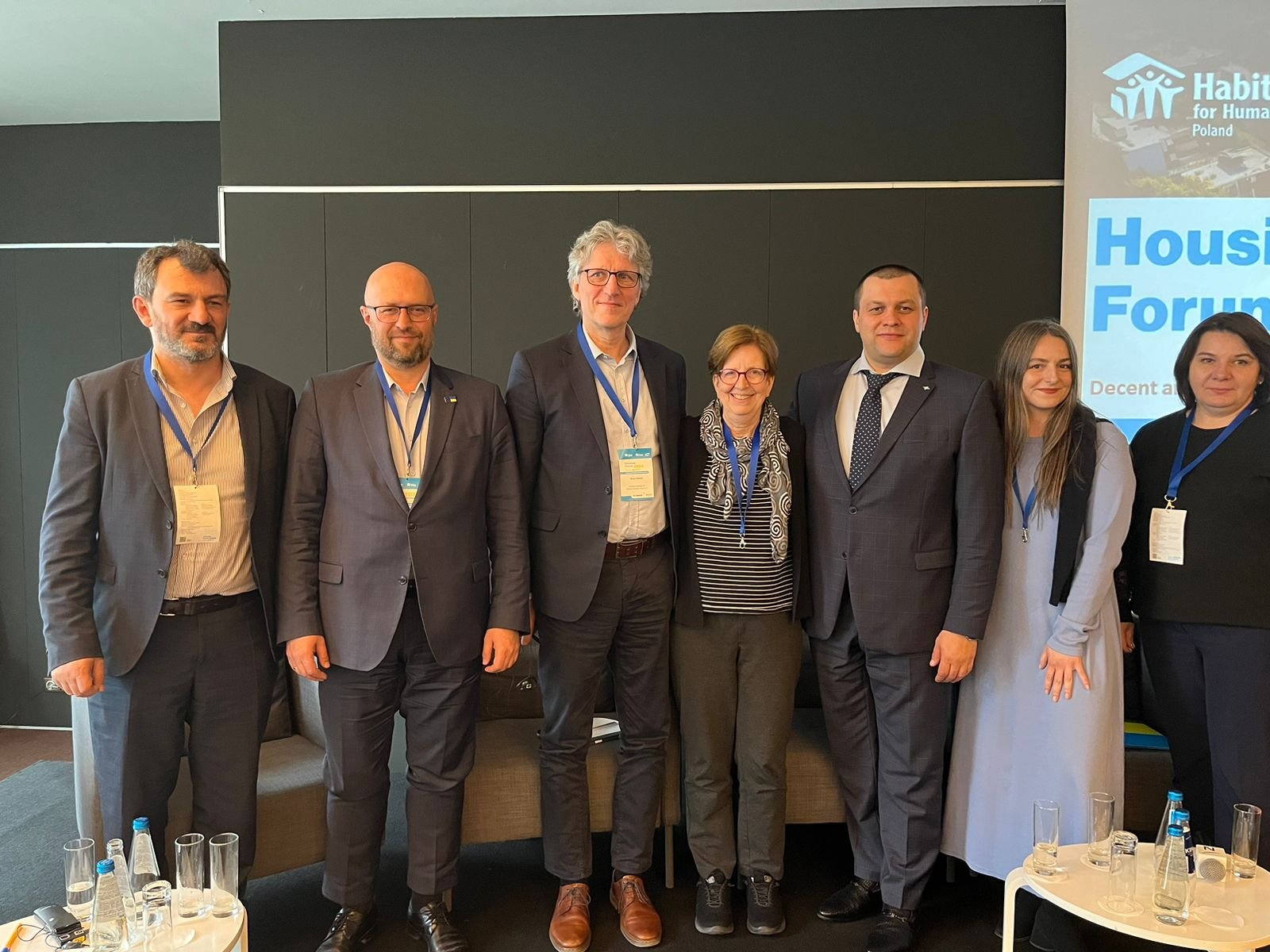2024 Europe Housing Forum, Warsaw
Pictured from left to right: Moderator: Besim Nebiu, Director CEE/CIS, Habitat for Humanity; Speakers: Grzegorz Gajda, Senior Urban Specialist, European Investment Bank; Knut Höller, Housing Initiative for Eastern Europe; Ellen Hamilton, Lead Urban Specialist, World Bank Group; Serhii Komnatnyi, Regional Consultant, UNECE; Anna Pashynska, Co-founder & Chairman of the Board, METALAB; Inna Viktorivna Sarapina, Head of the Department for the Formation and Implementation of Housing Policy, Ministry of Communities, Territories and Infrastructure of Ukraine.
2024 Europe Housing Forum
Warsaw, Poland, April 16-17
Key Challenges in Reforming Ukraine's Housing Policy
On April 16-17, Habitat for Humanity invited UNECE to participate in the 2024 Europe Housing Forum in Warsaw, to discuss innovative solutions to address housing challenges and to promote sustainable urban development and economic growth.
During the panel discussion Breakout 3: 'Rebuilding and rights: Navigating property and housing challenges in post-conflict Ukraine,' UNECE Regional Consultant to the UN4UkrainianCities project, Serhii Komnatnyi, emphasized UNECE´s efforts in supporting the Government of Ukraine to develop a new framework for housing policy. A key component of the UN4UkrainianCities project is to support the efforts of the Ministry of Restoration to develop a new framework for Ukraine's housing policy, through the development of the Draft Law 'On the Fundamental Principles of Housing Policy'. UNECE project experts have been actively involved in the Ministry's working group that developed the Draft Law and have organized several capacity building events.
During the panel, the following issues were highlighted as key challenges in establishing a sustainable housing policy in Ukraine:
1. Developed in 1983, the existing Housing Code of Ukraine - despite having been amended several times - is outdated and unable to address the large-scale housing destruction and internal displacement of citizens caused by the ongoing conflict in Ukraine. The Code also stipulates that the state must provide free housing to all citizens regardless of their social or financial status. New principles and policy objectives have been proposed within the Draft Law to replace the Code of 1983, to change the philosophy regarding who is responsible and eligible for state-supported housing solutions.
2. A significant challenge for Ukraine's new housing policy is the lack of a market for affordable rental housing, including social housing. Currently, 98% of housing is privately owned, much of which was state-owned before privatization. The absence of an affordable rental housing market highlights the urgent need for Ukraine to restructure housing funds and establish a legal framework for developing affordable rentals.
3. The lack of transparency in current housing policy means there is no unified platform for citizens to access information on housing issues. A Unified Information and Analytical Housing System has been proposed to ensure transparent accounting of those eligible for state housing support, and to provide an inventory of housing that can be used as service or social housing.
4. The fourth challenge is the lack of strategic planning when it comes to housing policy formulation, based on detailed assessments of current needs and planning of future policy measures. The Draft Law suggests establishing programmatic documents for housing policy, primarily the State Strategy for Housing Policy in Ukraine. This document aims to define the main tasks and objectives for Ukraine´s housing policy over the next 5-7 years, identifying key issues of national priority.
The UN4UkrainianCities project aims to support Ukraine in crafting a housing policy that not only addresses immediate needs, but also aligns with the long-term principles outlined in the UN Geneva Charter on Sustainable Housing, the 17 SDGs, the New Urban Agenda, the Housing Partnership Action Plan for the EU, and the Guidelines for the Implementation of the Right to Adequate Housing.
Written by Serhii Komnatnyi and Anya Magotra.

